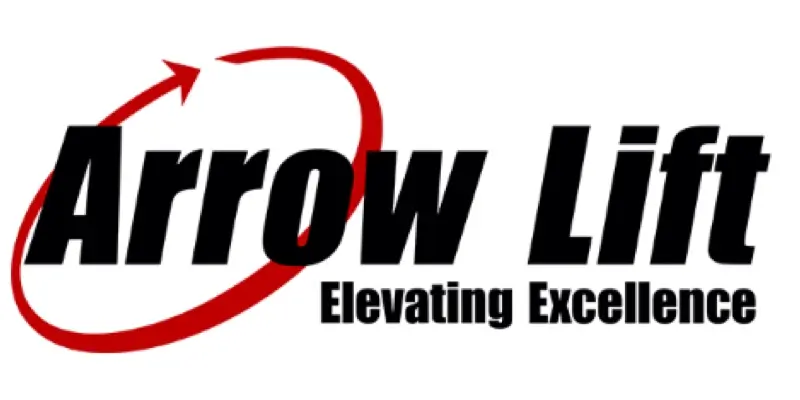Best Home Elevators
Updated:
Retirement Living takes an unbiased approach to our reviews. We may earn money when you click a partner link. Learn More
We evaluated 14 of the best home elevator companies, carefully weighing pricing, customer support, types of residential elevators available, expert ratings, and customer reviews. The six best elevators for homes are Arrow Lift, Stannah Home Elevators, Residential Home Elevators, Inclinator Company of America, Pneumatic Vacuum Elevators LLC, and Savaria.
- Knowledgeable technicians and representatives
- Test-drive lifts in showrooms
- Professional installation included
Shop stair lifts, luxury home elevators, and quality, custom wheelchair lifts in one of many showrooms across the Midwest and California. Arrow Lift also offers comprehensive service and maintenance plans on all products, including extended warranty options.
- Great Configuration Options
- Custom Designed
- Professional Installation
ACME a division of Stannah offers custom elevators for your home. Stannah Elevators come in two varieties: pitless or shaftless. Stannah Elevators are great for consumers who have difficulty managing the stairs in their home due to aging, pain, limited mobility or disability.

- Great Custom Options
- Custom designed elevators
- Factory-direct installation
Residential Elevators is a family-owned business that provides factory-direct home elevator sales and installations. Residential Elevators offers traction and hydraulic elevators designed for your home.
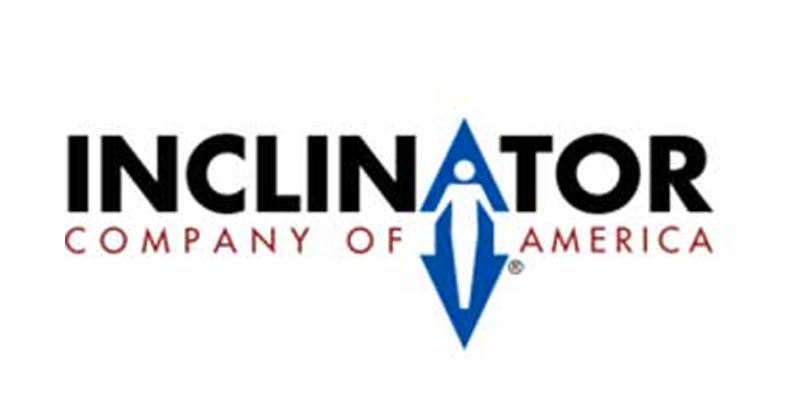
Inclinator
- Most Customizable
- Made one-at-a-time for easy customization
- Cable drum drive system
Inclinator is the first home elevator company to bring customizable elevators into the home. Their Elevette elevator is a cable drum drive system and comes in five cab styles.

Pneumatic Vacuum Elevators LLC
- Most Eco-friendly
- Air-driven, low-energy cost elevators
- Low-maintenance. Service calls every five years
Pneumatic makes three models of air-driven home elevators. The cylindrical shape of the cabs takes up less room – 30 to 52 inches in diameter, depending on the model. The vacuum elevators use air pressure to raise and lower the cab, using no electricity during the descent and about 4.7 kilowatts during the ascent.

Savaria Home Elevators
- Good Value
- Customizable
- 30+ Years Experience
Savaria makes and sells five models of home elevators that include hydraulic, gearless and winding drum elevators. Savaria home elevators feature 360-degree views, multiple cab sizes and styles and gearless traction technology for quiet rides.
The Best Elevators for Your Home
This guide covers home elevator features and benefits, tips for choosing the best home elevator for your mobility needs, and individual evaluations of the top companies. It also includes answers to frequently asked questions about home elevators.
Who Are Residential Elevators Best For?
Home elevators are for people who live in multi-level homes and need help moving from floor to floor. For many, the decision to purchase a home elevator is to accommodate wheelchair users and people with mobility issues. Home elevators are different from U.S. wheelchair lifts that act as platform lifts, or stair lifts that move a person up and down stairs in their home using a smaller seat.
Of all residential lift systems, home elevators are the most expensive due to their size, installation requirements, and components.
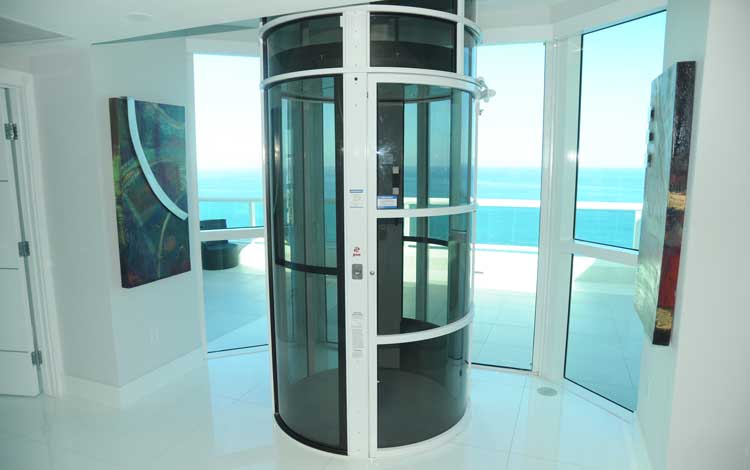
Source: Access Lifts Limited
How Much Room Do You Need to Fit an Elevator Into Your Home?
When installing an elevator in your home, you’ll generally need a space that is at least five-by-five feet, or 25 square feet of floor space.
The dimensions of a residential elevator vary, but the cab usually has a depth of 36 to 60 inches, a width of 48 to 60 inches and a height of at least 80 inches.
To comply with the Americans with Disabilities Act of 1990 (ADA), a home elevator cab must meet the following requirements:
- Depth of at least 51 inches
- Width of at least 68 inches if it uses side doors (at least 80 inches if it uses centered doors)
- Door width of at least 36 inches
For Arrow Lift elevators, the standard interior cab for a home elevator is 15 square feet, but we found other companies that have smaller cabs of 12 square feet. Consider the size of the cab when comparing the best home elevators — especially if you plan to use wheelchairs or transport multiple people in one trip.
Also consider how your floor plan lines up — an elevator location may work on the first floor, but not line up on the second floor. A design consultant, accessibility consultant, or contractor can help determine whether your home can accommodate a residential elevator.
Best Home Elevators, Reviewed
Our in-depth analysis of affordable home elevators focuses on the features that are important to seniors aging in place, those with mobility concerns, and budget-conscious family members looking for safer in-home solutions. This includes:
- Price
- Elevator types
- Safety features
- Sizing and accessibility
- Customization options
- Warranties
- Availability nationwide
We researched the top 14 companies that manufacture home elevators. Then, we narrowed the list to our top three based on specific criteria we set by extensive government and consumer research. The result was a list of the best home elevator companies.
Arrow Lift Home Elevator Review
Knowledgeable technicians and representatives |
Arrow Lift is a family-owned accessibility lift company in business since 1985. Its stylish, luxury home elevators are safe and aesthetically pleasing, making them a great alternative to wheelchair lifts or stair lifts. Professional technicians and expert representatives will guide you through the selection and installation process, and you can visit showrooms to see its products in person.
- Maximum weight capacity: 350 – 1,400 pounds
- Types of elevators available: Traction, pitless, hydraulic, pneumatic
- Max Distance: Up to 5 levels
- Price range: $30,000 – $100,000+ ; Must contact for a custom quote
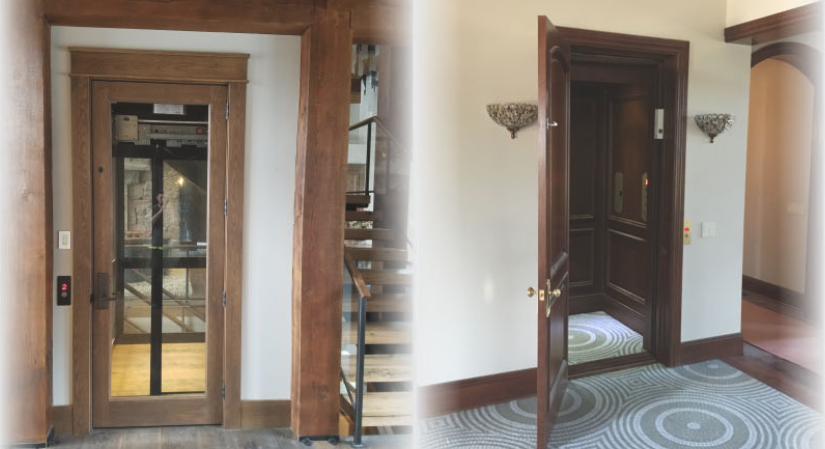
To learn more, read our comprehensive Arrow Lift review or get a free custom quote from the company.
Residential Elevators Review
Great custom options
Residential Elevators is a family-owned business that provides factory-direct home elevator sales and installations. The company manufactures and sells traction, pitless, and hydraulic elevators for home use. Residential Elevators offers eight cab choices with design features that can accommodate any aesthetic, from farmhouse to modern to classic. You can also design a custom elevator.
- Maximum weight capacity: 950 pounds
- Types of elevators available: Traction, pitless, hydraulic
- Max Distance: 50 feet
- Price range: Not listed; Must contact for a custom quote
Inclinator Home Elevator Review
Most customizable
In 1923, self-taught mechanical engineer C.C. Crispen invented the Inclinator, a patented electric-powered folding wooden chair with a footrest that moved on rollers up and down a steel rail fastened to stairs. Today, the family-owned Inclinator Company of America has evolved their design to include accessible home elevators that are also beautifully designed.
- Maximum weight capacity: 950 pounds
- Types of elevators available: Traction, cable, hydraulic
- Max Distance: 50 feet
- Price range: Not listed; Must contact for a custom quote
Design your home elevator on the website — you can choose from 18 different cabin configurations, and a variety of finishes and materials.
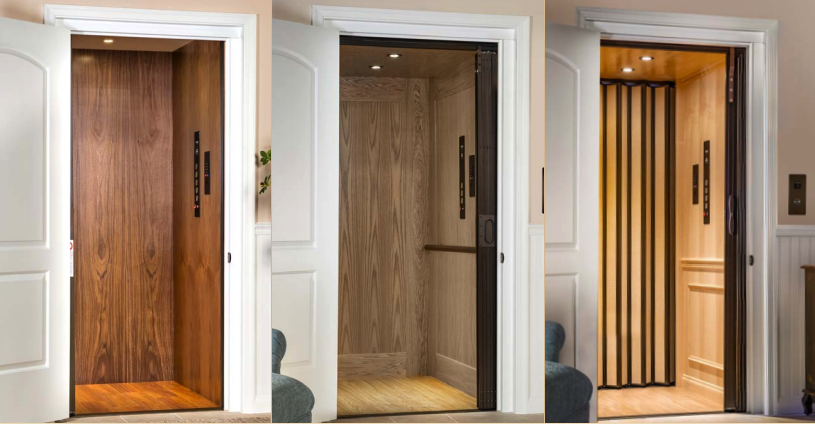
Pneumatic Vacuum Elevators LLC Review
Most eco-friendly
Pneumatic Vacuum Elevators LLC designs and manufactures vacuum elevators. The Florida-based company has been bringing eco-friendly elevators to homes on five continents since 2002.
- Maximum weight capacity: 1,000 pounds
- Types of elevators available: Pneumatic
- Max Distance: 50 feet
- Price range: Not listed; Must contact for a custom quote
Pneumatic Vacuum Elevators currently offers three home elevator models for wheelchairs and small spaces. Pneumatic Vacuum Elevators use air pressure to move the cabin, so the elevator itself uses a minimal amount of electricity. With no chains or cables, there is no need for lubrication, and since air is the power source, there is no hydraulic fluid. As a result, regular maintenance is less than that of other brands. The company recommends you forgo yearly service calls and contact them every four to five years (or 15,000 rides) for a replacement seal.
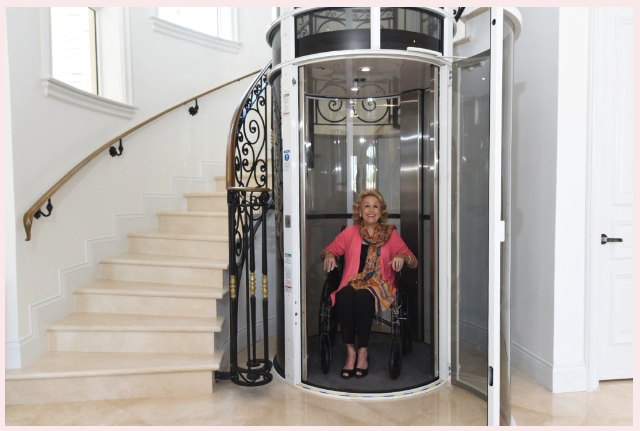
Another advantage to owning a Pneumatic Vacuum Elevator is that it is not built into the framework of your home, so you can take your elevator with you if you move. You can also move the entirely self-contained unit to another location in your home if you decide to remodel or renovate.
Savaria Review
Good value
Savaria makes and sells six home elevator models. With the eye-catching design of the Vuelift, the smooth ride of the Eclipse, the technology of the Gearless series, and space-saving and affordable Telecab home elevators, Savaria can work with your interior design to find the perfect blend of comfort and price for your needs.
- Maximum weight capacity: 1,400 pounds
- Types of elevators available: Traction, hydraulic, cable-driven
- Max Distance: 60 feet
- Price range: Not listed; Must contact for a custom quote
Savaria’s models include the Vuelift, Eclipse, Infinity, Gearless and Telecab. Depending on which model you buy, Savaria elevators have a weight limit between 500 and 1,000 pounds, a maximum travel of 23 to 60 feet, and a travel speed of 20 to 40 feet per minute.
Read our comprehensive Savaria review.
Features to Consider When Comparing the Best Home Elevators
A reputable residential elevator company can help you decide which type of elevator is best for your home, including the drive system and electrical components (more on that below), but there are several additional factors to consider that are more specific to the model of the elevator:
Safety Features
There current national safety code for elevators is detailed in ASME ANSI A17.1/CSA B44-2016, section 5.3. This requires safety features such as:
- Automatic gate or door closing
- Battery backup in case of a power outage
- Door interlocks that cannot be released while the cab is moving
- Emergency brakes
- Alarms and intercoms
- Lighting and lit control panels
- Handrails
Dimensions
Consider who — and what — will be riding between floors. Those with wheelchairs, mobility aids, or even respiratory aids such as portable oxygen tanks will require more cab space and a higher weight capacity, while a single adult who can stand upright on their own may be fine with a smaller elevator.
Some brands tout smaller, more compact cab sizes. This is great for smaller homes and tight spaces, but this isn’t always best. Consider both the cab size and the overall size of the lift before making a purchase.
Weight Limits
As you determine who and what will accompany you in the elevator, you’ll also gravitate toward models with higher weight capacities, which in turn, may increase the cab size on some models. Maximum weight ratings vary from 350 pounds to 1,400 pounds. While the latter might seem excessive, equipment and riders quickly add up. For example, an electric wheelchair can weigh up to 250 pounds, and multiple adults can weigh close to 1,000 pounds.
Types of Home Elevators
From small home elevators designed to fit in compact spaces to larger in-home elevator models that can accommodate a wheelchair, there’s an option out there that meets your budget and design needs.
The most common types of home elevators for your home include:
- Cable-driven elevator systems, also called winding drum elevators, use two cables to raise and lower the cab across multiple floors. Its control system is often located in a separate machine room, so installing this type of elevator in your home will require some room.
- Chain-driven elevators are similar to cable-driven elevators, but they use a chain wound around a drum instead of a cable to raise and lower the cabin. Chains are more durable than cables and don’t need replacing as often. Chain-driven units also do not require a separate machine room, but they do need overhead space. Depending on your roof line, these may not be an option in your home.
- Traction, or MRL (machine room-less) elevators, work by sliding up and down a track with a counterweight. While they don’t require a machine room, they do need a “pit” at the bottom of the lift.
- Hydraulic elevators are powered by a piston that travels inside a cylinder. The cab takes up less space and often fits in homes with shorter ceilings. The weight capacity is also higher and the unit is quieter than other types of elevators.
- Pneumatic elevators utilize a vacuum system within a tube to power their movement. No pit or machine room is needed, so these are great options for retrofitting into existing homes. However, they usually do not accommodate larger mechanical wheelchairs.
Home Elevator Costs
Our research indicates that the cost of home elevators ranges from $20,000 to $100,000. This is because adding a home elevator comes with construction costs that vary greatly by existing home setup, the type of elevator you choose, and the installation costs.
- Arrow Lift home elevators: $30,000 – $100,000+
- Stannah home elevators: Starting at $20,000
- Residential Elevators home elevators: $15,000 – $40,000+
Installing a Home Elevator
When budgeting your residential elevator costs, don’t forget to account for installation. It can take professionals between one and two weeks to install a new elevator in your home. However, it’s important to remember that builders need to do some prep work before even installing the elevator, including planning where to build the pit and locate the mechanical components. If additional structural work is needed to reinforce the lift, you’ll need to have your contractor factor this into the installation costs as well.
We recommend talking with a licensed contractor before purchasing a lift, so you know what size requirements, features, and budget to consider. Coordinate with both the installer and the home elevator company as soon as possible to ensure your home elevator installation goes smoothly.
Many states have specific requirements that residential elevators must meet. Therefore, we recommend working with a local or state inspector to examine the elevator before using it.
Frequently Asked Questions about Home Elevators
Does Medicare help pay for the installation of a home elevator?
No, Medicare considers elevators convenience items rather than medical necessities, even for those with disabilities that make it impossible to climb stairs, so there is no coverage for home elevators. If you’re a veteran, Home Improvements and Structural Alterations (HISA) Program grants can help pay for the installation of an elevator in the home.
Are home elevators safe?
Home elevators have very stringent safety standards from the American Society of Mechanical Engineers (ASME). Elevators for the home also must meet state and local code requirements and pass those inspections.
What is the weight limit on home elevators?
Maximum weight capacities of home elevators vary from product to product, but most residential elevators have a weight limit of 500 to 1,400 pounds.
How much space is needed for a home elevator?
In general, plan to use a space between 15 and 25 square feet to accommodate a residential elevator. Some shaftless elevators may fit in smaller, while other types of elevators will require a larger space.
How fast do home elevators move?
The average speed for a home elevator is 30 to 40 feet per minute.
Should I choose an elevator or a stair lift?
Your decision to install a home elevator versus a stair lift depends on your home’s layout and your mobility needs. Home elevators can be installed in several locations throughout the home, and your customization options are greater than a stair lift. On the other hand, stair lifts are more affordable and can be removed if you no longer need the lift.
Concluding Thoughts on Home Elevators
Bottom Line: Get multiple quotes and ensure factory-trained technicians perform the installation.
If mobility is an issue for you or a loved one and stairs at home are becoming a safety hazard, a home elevator is a viable option. Today, there are more choices in styles, types, and financing than ever before, making it easier to find a home elevator that meets your needs.
| Company | Best For | |
|---|---|---|
| 1 | Arrow Lift | Knowledgeable technicians |
| 2 | Stannah Home Elevators | Great configuration options |
| 3 | Residential Elevators | Great design options |
| 4 | Inclinator | Most customizations |
| 5 | Pneumatic Vacuum Elevators LLC | Most eco-friendly |
| 6 | Savaria | Good value |
